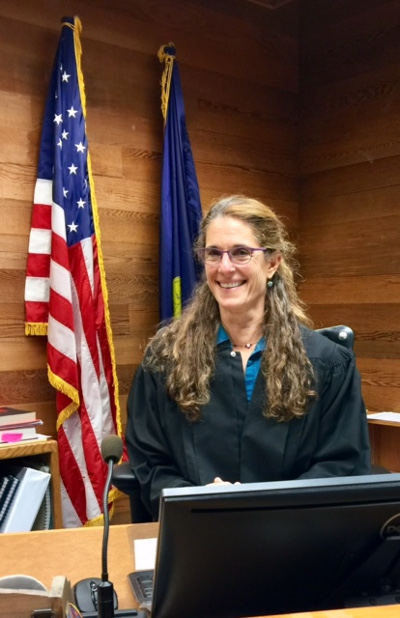 The Honorable Ilisa Rooke-Ley, Lane County Circuit Court
The Honorable Ilisa Rooke-Ley, Lane County Circuit Court
Before I became a Lane County Circuit Court Judge six years ago, I was an Assistant Public Defender in Florida and Oregon. As a judge, I have presided over criminal dockets, “ex parte”, civil show cause, FED’s, small claims, traffics, juvenile and tried both civil and criminal jury trials. My current assignment is Treatment Court and Veteran’s Treatment Court. Here are some tips (advice) for both seasoned practitioners and newcomers:
- If you practice law in Oregon, you will have a client, no matter what your field of practice, whom would benefit from treatment court.
- If your county has a treatment court, familiarize yourself with the practices and procedures. These courts save lives, families and precious tax dollars.
- If your county does not have a treatment court, start one. The National Association of Drug Court Professions (nadcp.org) and Oregon Association of Drug Court Professionals (oadcp.org) websites have everything you need to know about what it will take to implement a treatment court.
- Humanize your client whether during a trial, a settlement conference or placing a settlement on the record. Your client knows when you are rushed, unprepared or not committed to the matter at hand. The justice system, your reputation and your client suffer when you are just going through the motions.
- When asked for the legal authority of a proposition you are suggesting, do not utter the words, “I know there is a case…but I cannot remember the name … I have no cite…”
- If you decide to represent someone in a juvenile court matter, learn, understand and use the proper legal terms associated with juvenile court jurisdiction. Talk to other lawyers and staff before you appear to familiarize yourself with the proper procedures.
- Err on the side of formality. Always. Stand whenever addressing the judge even for a simple “yes” or “no “.
- Criminal legal issues are frightening and confusing to your clients. Make you sure you address potential consequences of a conviction such as a driver’s license suspension or the lack of ability to leave the state due to probation. Make sure to talk to your client about “Waiver of Indictment” and “Waiver of Dismissed Charges” before appearing before the judge.
- Prepare your client for the particular judge and her rules. Don’t wait until the Judge admonishes your client for wearing an inappropriate shirt or a hat. Teach your litigant how to address the judge.
- Court staff are listening and reporting to judges. Court staff are the people you want on your side. Disrespecting a judge’s staff is very concerning and your reputation will suffer.
- Judges have a Birdseye view of the courtroom. We see your impatience, grimaces and eye rolling. And so does your client. Model professional behavior.
- If you are representing a party and the other side is pro se, proceed with grace and professionalism. Judges have a duty to report unprofessional behavior and that includes bullying pro se litigants by taking advantage of their lack of knowledge of the evidence code.
- A “shrug” is never an answer to a question.
- Dress to win and support your client by making suggestions about his or her apparel.
- Do not say “my bad” ever.
- Colloquiums are best left for the judge.
- Object with certainty AND with basis (“Objection, hearsay” or “Objection, lack of foundation”).
- “Ex parte” is a court proceeding and pro se litigants will mimic your attitude.
- Read your yellow books (also known as the Advance Sheets). Stay ahead of the game.
- Practice the type of law you love and love your practice of law.